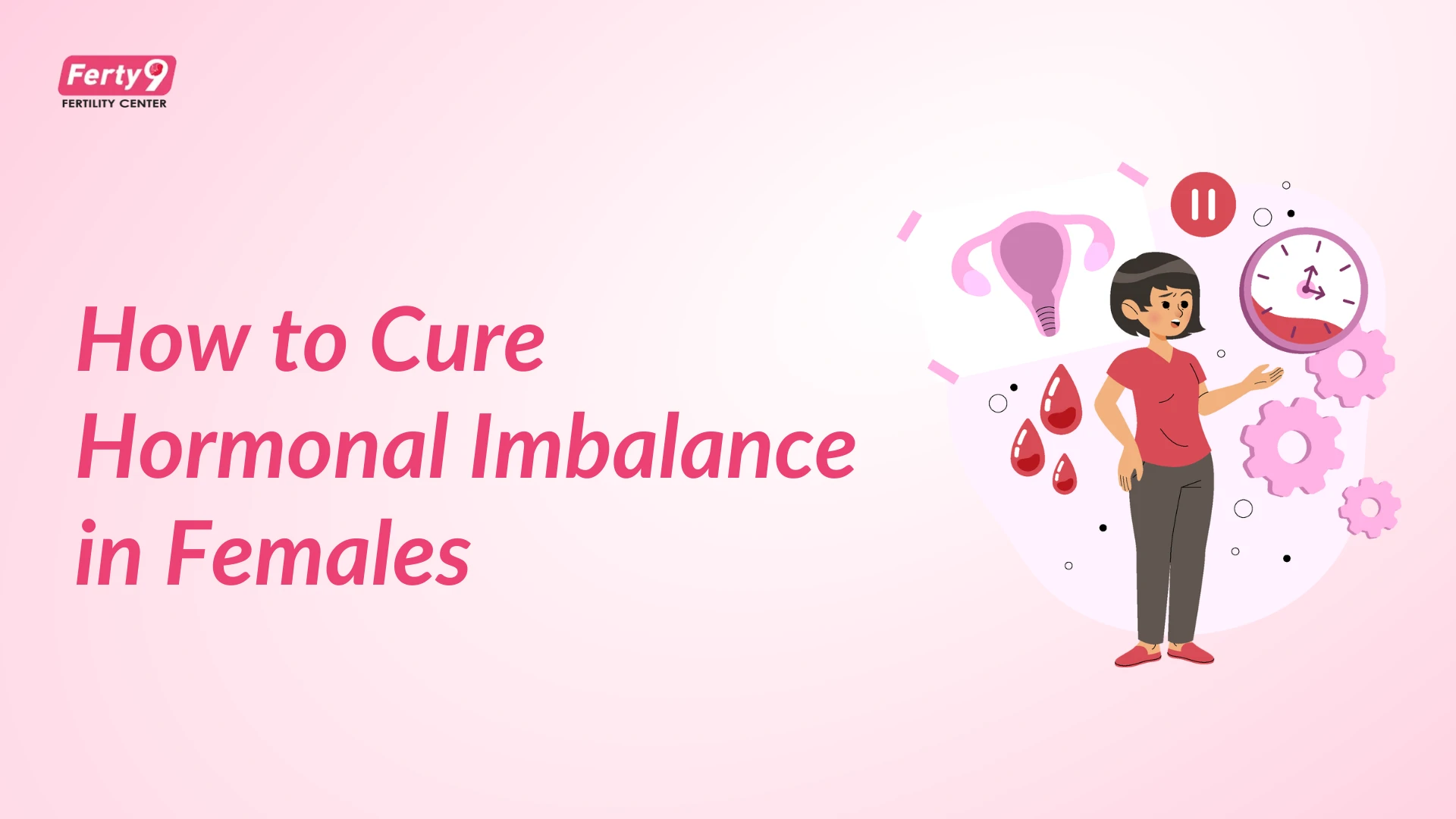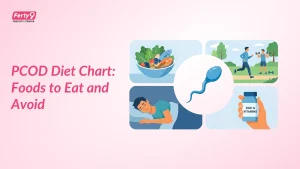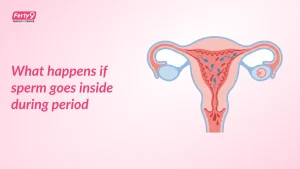Do you often feel tired for no reason? Are your periods irregular, or are you struggling with sudden weight gain and mood swings? These aren’t just signs of a “bad week”—they could be your body’s way of telling you that your hormones are out of balance.
Hormonal health is the cornerstone of a woman’s overall well-being, impacting everything from your energy and mood to your fertility. The great news is that you don’t have to live with these symptoms. At Ferty9, we believe in empowering you with the knowledge to restore your body’s natural rhythm. Let’s explore the causes, symptoms, and the best natural and medical ways to cure hormonal imbalance.
What is Hormonal Imbalance?
Think of hormones as your body’s chemical messengers. They travel through your bloodstream, telling your organs and tissues what to do. Key hormones in women include estrogen, progesterone, thyroid hormones, and cortisol. A hormonal imbalance occurs when there is too much or too little of a particular hormone, disrupting your body’s delicate harmony.
These messengers regulate critical functions like your metabolism, sleep cycles, reproductive system, and stress response.
Causes of Hormonal Imbalance
Several factors can disrupt your hormonal balance:
- Lifestyle Factors: The stress of modern life, a diet high in processed foods, lack of quality sleep, and insufficient exercise are major contributors.
- Medical Conditions: In India, PCOS (Polycystic Ovary Syndrome) and thyroid issues are very common causes. Diabetes can also play a role.
- Aging and Menopause: As women approach menopause, levels of estrogen and progesterone naturally decline, leading to significant changes.
- Environmental Triggers: Everyday toxins found in plastics, pesticides, and cosmetics can act as endocrine disruptors, interfering with your hormones.
Common Symptoms of Hormonal Imbalance
- Irregular, heavy, or missed periods.
- Unexplained weight gain, especially around the waist.
- Persistent acne, particularly along the jawline.
- Hair loss on the scalp or excess hair growth on the face or body.
- Frequent mood swings, anxiety, or irritability.
- Constant fatigue and feeling drained of energy.
- A noticeable decrease in your sex drive (libido).
Natural Ways to Cure Hormonal Imbalance
For many women, simple yet powerful lifestyle changes can make a world of difference.
Healthy Diet for Hormonal Balance
Food is medicine when it comes to your hormones. Focus on a diet rich in whole, natural foods.
Foods That Help:
- Leafy Greens: Include plenty of spinach (palak), fenugreek (methi), and other local greens.
- Healthy Fats: Nuts, seeds (flax/alsi, chia), and avocados help produce hormones.
- Omega-3 Rich Foods: Fatty fish, walnuts, and flaxseeds fight inflammation.
- Protein: Ensure adequate protein from sources like lentils (dal), chickpeas, eggs, and lean meats.
Foods to Avoid:
- Processed Foods: Limit packaged snacks and fast food.
- Refined Sugar: Reduce intake of sugary sweets, desserts, and white bread.
- Excess Caffeine: Too much chai or coffee can raise stress hormones.
Regular Exercise
Physical activity helps regulate insulin and reduce stress hormones.
Best Exercises:
- Yoga & Pranayama: Excellent for reducing stress and improving hormonal function.
- Strength Training: Builds muscle, which boosts metabolism.
- Walking: A simple, powerful way to stay active. Aim for 30 minutes daily.
Stress Management
Chronic stress floods your body with cortisol, which can disrupt all other hormones.
Techniques:
- Meditation & Deep Breathing: Even 10 minutes a day can have a profound effect.
- Journaling: Writing down your worries can help manage them.
- Make Time for Hobbies: Engage in activities that bring you joy.
Adequate Sleep
Sleep is when your body repairs itself and resets its hormonal clock.
Tips for Better Sleep:
- Aim for 7-8 hours of quality sleep per night.
- Maintain a consistent sleep schedule.
- Avoid using your phone or watching TV right before bed.
Herbal and Natural Remedies
Certain traditional herbs may support hormonal health. Always consult your doctor at Ferty9 before starting any supplements.
- Ashwagandha: A powerful adaptogen well-known in India for helping the body cope with stress.
- Evening Primrose Oil: May help with PMS symptoms.
- Herbal Teas: Calming teas like chamomile and green tea are beneficial.
Medical Treatments for Hormonal Imbalance
If lifestyle changes aren’t enough, it’s crucial to seek expert medical help.
Hormone Replacement Therapy (HRT)
HRT is primarily used to relieve moderate to severe symptoms of menopause, such as hot flashes and vaginal dryness, by replacing the hormones the body no longer makes.
Birth Control Pills and Medications
For younger women, hormonal contraceptives can regulate periods, manage acne, and control symptoms of conditions like PCOS by providing a stable dose of hormones.
Treatment for Underlying Conditions
At Ferty9, we focus on treating the root cause.
- PCOS Management: We create personalized plans involving lifestyle changes and medication.
- Thyroid Treatments: We diagnose and manage thyroid disorders with appropriate medication.
- Insulin Resistance: We guide you on diet and exercise, sometimes with medication, to improve insulin sensitivity.
Consulting a Gynecologist or Endocrinologist
If your symptoms are persistent, it’s time to see a specialist. The expert Gynecologists and Fertility Specialists at Ferty9 can conduct the necessary tests, provide an accurate diagnosis, and create a tailored treatment plan for you.
Lifestyle Changes for Long-Term Hormonal Health
- Create a Balanced Daily Routine: Consistent meal and sleep times support your body’s natural rhythms.
- Limit Exposure to Chemicals: Reduce the use of plastic food containers and choose natural personal care products where possible.
- Stay Hydrated: Drink plenty of water throughout the day, especially in the warm climate of Andhra Pradesh.
- Build Emotional Resilience: Practice mindfulness and develop healthy coping strategies for stress.
Prevention Tips
- Get routine blood tests to detect any imbalances early.
- Maintain healthy eating habits as a lifelong practice.
- Make regular physical activity a priority.
- Prioritize your mental peace and seek help when needed.
Summary
Restoring your hormonal balance is a journey toward feeling like your best self again. It starts with empowering lifestyle choices—a nutritious diet, regular movement, stress management, and quality sleep.
However, if your symptoms persist, professional guidance is essential. Don’t let a hormonal imbalance control your life or your fertility journey. The expert team at Ferty9 is here to provide the answers and compassionate care you deserve.





























